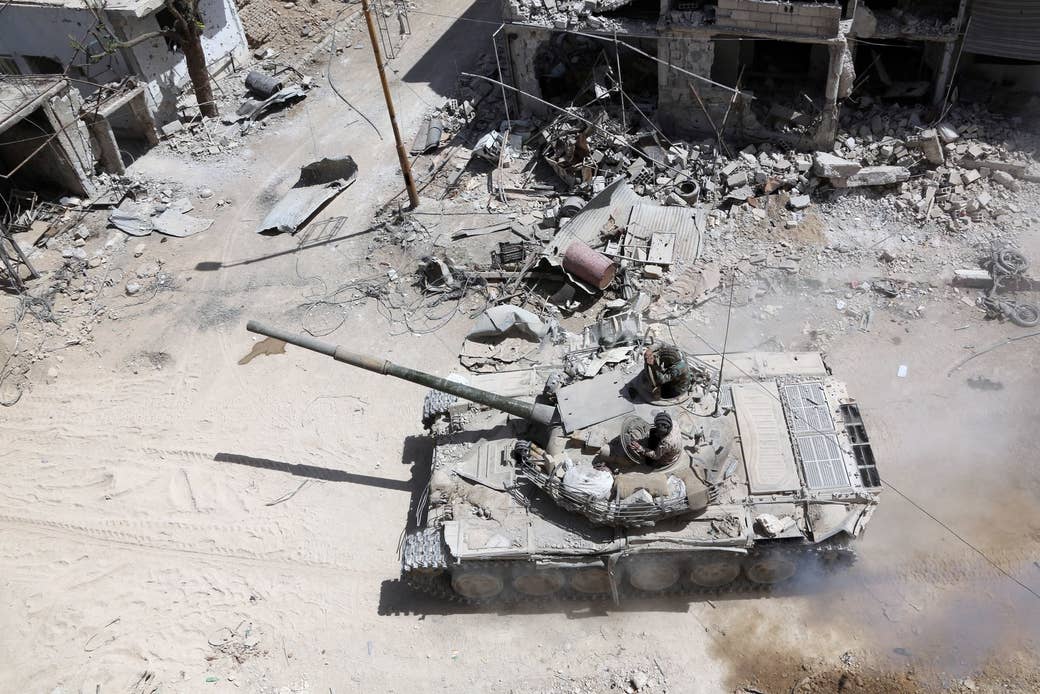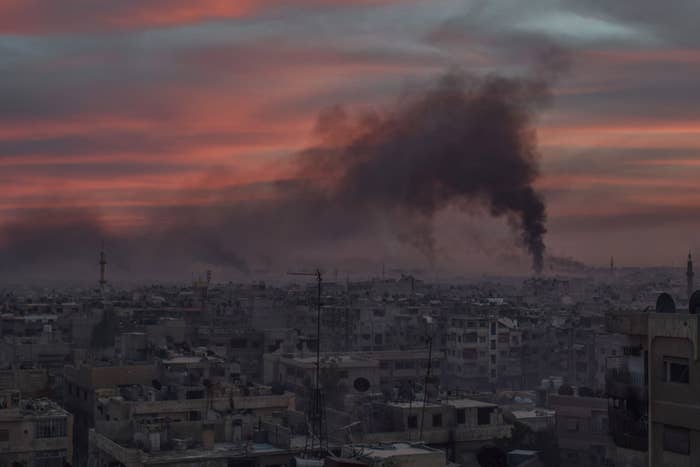
ISTANBUL — Syrian rebel leaders have told BuzzFeed News that they support military action against the regime of Syrian President Bashar al-Assad by the US and its allies following a chemical attack on Saturday that left dozens dead, including children.
The Trump administration said it intends to announce its response to the attack within 48 hours. That comes after a missile attack on Monday that Russia and Syria have said was carried out by Israel. Rebel leaders noted that that attack only targeted Iranian positions at the crucial T4 air base and had no effect on the regime overall.
Rebel leaders said that they support military action against the regime for both its military and political benefits. Rebels’ loss of East Ghouta, a strategic suburb of the capital Damascus, to the regime Monday, as well as last year’s loss of Eastern Aleppo, were grave setbacks to the rebels, who now control few population centers.
Ibrahim al-Idlibi, an FSA spokesperson, said the suspected Israeli strike on Monday targeted Iranian facilities at the air base and was seen by the rebels as a continuation of conflict between Israel and Iran. He said he hoped the US or its allies would act in direct support of the campaign against the regime of Bashar al-Assad.
“This strike today did not make any political changes and not even military because the military feasibility of the strike was limited only to the centers of the Iranian militias, in addition to those who did this, because the situation would be completely different if it was one of the friends of Syria is the one who did this strike,” al-Idlibi said.
The hope is that action by the US would provide “more positive results and raise morale for civilians and fighters, and it would keep us from losing hope that the international community hasn't abandoned us.”
The Syrian war has roiled the country since 2011 and led to more than 500,000 deaths and millions displaced. A multitude of countries — including Turkey, Iran, Russia, Syria, the US, and NATO allies — as well as a slew of rebel and pro-regime groups such as ISIS and Hezbollah are deployed through the country in a complex patchwork that leaves little room for error.
This crowded battlefield leaves open the possibility of a rapid and unintentional escalation, said a British diplomat who used to work with the rebels.
“The rebels are reeling with the loss of Ghouta, which follows the loss of Aleppo last year,” the diplomat, who isn’t authorized to brief the press on the record, told BuzzFeed News. “This is close to the end of major population centers being held by the rebels but a major statement by the US and maybe France could boost morale. The problem of course with a major attack is that [it] exponentially increases the risk of a stray bomb or missile or a shot-down aircraft turns into a catalyst for an accidental escalation. It’s a battlespace crowded with different armed factions so this is a significant risk.”

The Trump administration attacked the Syrian air base that was suspected of launching a chemical attack last year, but it was widely seen as superficial and did little to damage the regime or its allies. The Shayrat Airbase was struck with 58 cruise missiles and reports said about 15 attack aircraft were damaged, although the base itself was back in operation the same day.
Israel regularly strikes targets inside Syria, but both regime and rebel officials said they believed the strike the country was suspected of carrying out early Monday against Iran and its Lebanese Shiite proxy Hezbollah wouldn’t have an effect on the direction of the war. Iranian news agencies said 14 people were killed in that attack.
“The strike that took place yesterday is a strike to locations in which Iranian forces are located in the context of the conflict between Iran and Israel,” said Mona Ghanem, who represented the regime at a largely failed peace conference in the Russian resort city of Sochi. “The strike has no effect on the Syrian political reality because it was to serve Israel, which is trying to benefit from Syrian reality and not to push for a political solution,” she told BuzzFeed News.
One rebel commander, Faris Bayoush, said that he welcomed strikes on any targets linked to the regime by anyone for any reason but asked that any action be substantive and not for appearances. He said last year’s cruise missile strikes over another chemical weapons attack failed because the US warned Russia the missiles were inbound, information that he said immediately found its way to the Syrian regime.
“Monday’s strike is no different from the previous strikes in terms of military objective and political influence, which is within a clear course of action,” he said. “The previous strike of the airport by the Americans was done after informing the Russians about it in advance. Therefore, the regime was informed about it and took its precautions. The Israeli strikes are only reported to the United States, so the Israeli strikes have a greater impact, especially on the Iranian side.”

